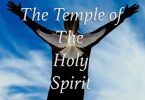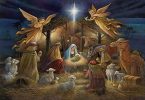4th Sunday of Easter (Year B)
Scriptures: Acts. 4:8-12; Ps. 117:1,8-9, 21-23, 26, 28-29; 1 Jn 3:1-2; Jn. 10:11-18
Last week, the news channels broadcasted news of how a railway track pointsman, Mayur Shelke, risked his life to save a child from being run over a train in Vangani Railway Station, Maharashtra. He was on duty to guide the trains when the six-year-old child fell on the track and his visually impaired mother was crying for help. Mayur jumped on the track, ran in the direction of the on-coming train and saved the child and himself with seconds to spare.
For his act of bravery, the Indian Railways awarded Mayur a sum of Rs 50,000, which out of his generosity, shared with 50% with the child. He also received a Java motorbike from industrialist, Anand Mahindra. Netizens too lavishly praised Mayur for his brave act. His sacrificial act showed that he was a true shepherd –leader in his given situation. We are called to be shepherd–leaders in our given situation. Jesus, the good shepherd teaches us by his own life.
The fourth Sunday of Easter is known as the Good Shepherd Sunday or Vocation Sunday in the Church. The image of Jesus as the Good Shepherd is the most dominating image among us. However, there is yet another image that should be kept in parallel to the image of the good shepherd – the crucifixion of our Lord. We might have reflected on different qualities of a good shepherd but his self-sacrificing element stands of among all of them. Today’s Gospel text highlights it more empathetically.
We shall briefly understand the nature of the sheep so as to understand the role of a good shepherd and his self-sacrificial element in his leadership. The sheep are always considered to be a gentle and useful animal. The old testament narratives tell us that they were considered as property and riches. At the same time, the sheep are considered to be the most dependable animal on the leader. They cannot live without the shepherd. The sheep always remain restless. It hardly sleeps. It requires good absolute security to lay down for a while. The sheep just follow other sheep blindly. They have no reasoning. One follows the other without any delay. The sheep are self-centred and thus get lost. I was surprised to see the sheep in the Holy land on the wailing wall. It was straying on the clip of those stones. How could it reach there? It is the habit to stray and remained unconcerned where they are. Sheep are demanding and stubborn.
It is against this sheep’s mindset and qualities. The shepherd looks after the sheep. The shepherd needs to have various qualities to tend the flock of sheep who are simple, demanding, stubborn, unconcerned, restless and must dependent on the shepherd. One of the most promising qualities of the shepherd should be, the self-sacrificing life. He should be a man of commitment to the point of death. The shepherd should be seen in the role of a leader.
Leaders cannot have success without sacrifice. Every successful leader in his respective field has made repeated sacrifices. Every time the leader gives up for good, he is challenged to give more as he proceeds to be the best. The leader makes sacrifices in his personal life too. He loses his time and energy, power and freedom. Gerald Brooks says, “When you become a leader then you lose your right to think about yourself.” Someone once rightly said, “As you rise as a leader, your responsibilities increase and rights decrease.” The life of a leader tells us that leadership means sacrifice. Making sacrifices in the life of a leader is not a one time but an ongoing process. The higher level of leadership demands that the person needs to make greater sacrifices.
Now we can compare these qualities with Jesus, the Good Shepherd. Jesus knew that all of us were his sheep. The scriptures tell us about it. Jesus had compassion for the people (emphasis added) because they were sheep without the shepherd (Mk. 6:34). The book of revelation says the lamb on the throne will be their shepherd. The book of psalms also gives us an idea that we were already considered as the sheep in the Old Testament. We, your people, the sheep of your pasture, will thank you forever and ever (Ps. 79:13). We are his people, the sheep of his pasture (Ps. 100:3).
It is not the only scriptures that make us understand that we, the human being behaved like sheep but we know from our behaviour. Our behaviour could be easily identified with them. Julie Plagens writes in her blog, “Why God compares us to sheep?” She says, we have no sense of direction. We just follow blindly. We are defenceless. We cannot get up without help. We are emotional and need the shepherd, etc.
Jesus called himself a Good Shepherd because he knew that he would even give his life to protect us. Like the Good Shepherd, Jesus made the greatest sacrifice to save us from the enemy of sin and death. Jesus repeatedly makes the sacrifice for us at every Eucharist. He dies even today for us. As the years are passing by, the sin of mankind has not stopped but it has drastically increased. Jesus forgives us and reveals his mercy at every interval. The devotion to Divine Mercy is such a beautiful example that Jesus, the Good Shepherd continues to make sacrifices for us. At every desecration of Eucharist when we receive the precious body and blood of Christ, Jesus surrenders his own right to judge us. He gives us one more opportunity to turn to him. Jesus continues to do it even after 2000 years.
The words of Jesus in the Gospel today, I am the Good Shepherd: the Good Shepherd is the one who lays down his life for his sheep (Jn. 10:11) are fulfilled when we see Jesus hanging on the cross. Like the Good Shepherd, Jesus died for us on the cross. Therefore, the image of Good Shepherd is overtaken by the image of Crucified Jesus. Jesus continues to make greater sacrifices for us. Can we now turn to his care?






